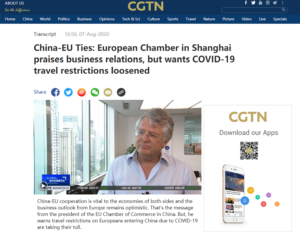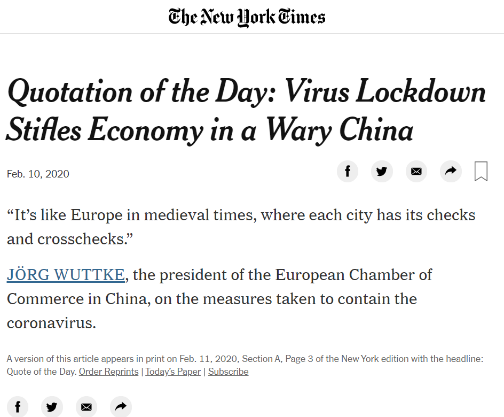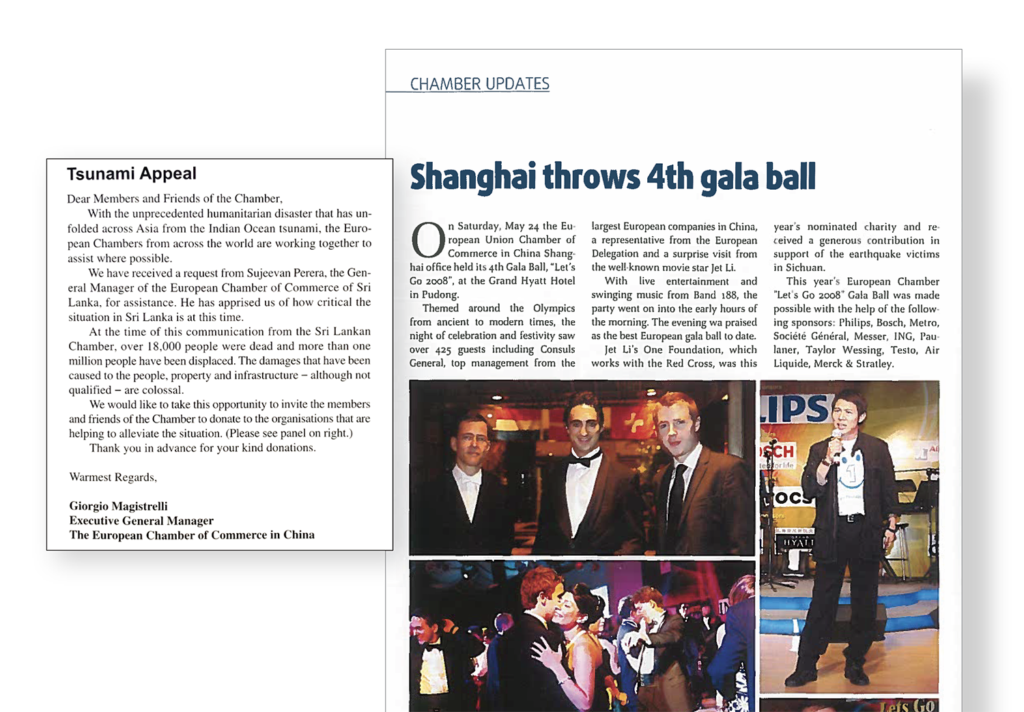
The European Chamber’s actions in times of need
The European Chamber’s main focus is on the business environment in China, but it does not operate in a vacumn. Our member companies all have staff that have spent years or even decades in this country, and have built up connections with the local society through families, friends and neighbourhoods. Therefore, when disasters hit China, they also hit our members and their staff. The European Chamber has responded over the years to these situations by gathering donations of goods, expertise and finances from our members and ensuring the resources get to where they are needed most.
COVID-19
I. COVID-19 Outbreak in China: Encouraging and Facilitating Donations and Support
The State Council announced the extension of the Chinese New Year Holiday in an effort to contain the virus outbreak by reducing the travel of individuals. During the extended holiday period, the European Chamber began facilitating donations of equipment and expertise from its member companies, and provided support to the Chinese government all across China.
II. Epidemic Prevention and Control, and Work Resumption
The Chamber used surveys and interviews to understand the key issues being faced by member companies. The Chamber then set about providing recommendations and solutions, facilitating direct access for members to raise their challenges with government officials, and continually providing policy updates.

III. Providing Valuable Information to Members and the Public During the Travel Ban
From the time China closed its borders to foreign nationals on 28th March, the European Chamber advocated strongly for gradual border re-opening—while ensuring that the strictest health and safety standards are adhered to—in order to enable European company employees and their families to get back to China and participate in getting China’s economy back on its feet.
IV. Active Media Engagement
From the beginning of the outbreak, the Chamber’s advocacy work has been supplemented by strong media engagement. Chamber spokespeople have been extremely active, providing updates on the current situation, expressing the challenges faced by European businesses in China and ensuring that accurate information shaped overall media narrative. By mid-May, the Chamber was quoted on the topic of COVID-19 in 316 articles by international media and 100 articles by domestic media. Among the top five media outlets, the Chamber was mentioned in seven Bloomberg articles, three Financial Times articles, seven New York Times articles, five Reuters articles and five Wall Street Journal articles.

SARS 2002/2003
Most of the advice on dealing with COVID-19 was almost word-for-word repetition of that distributed 17 years earlier during the SARS outbreak. While this is unsurprising, given that the two viruses are from the same family, the lessons of SARS were unfortunately forgotten once that particular outbreak subsided.
In an article by Greg Doddrell in the July 2003 issue of EURObiz, ‘Business SARSpension: Simple procedures to mitigate the business risk of SARS’, if all instances of SARS were replaced with COVID-19, the text would be just as relevant today. For example:
- “SARS has now caused a widespread re-evaluation of business risk and forced companies to realise that planning for the unexpected is important.”
- “One international manufacturing company with its head office in Shanghai recently had its IT manager quarantined at home at the start of a major server room construction project. If the quarantined person had been the managing director or financial controller, this could have caused major business disruption.”
- “…the threat of SARS is ever-present. Even when a vaccine is available, outbreaks will still be possible. Therefore, it makes good sense to plan for business disruption caused by epidemics like SARS or other unknown threats.”
Sichuan earthquake
The Sichuan earthquake of 2008, also called the Wenchuan earthquake, was a magnitude-7.9 quake (measured as magnitude-8.0 by the Chinese) in the mountainous central region of Sichuan Province in southwestern China, which occurred in the afternoon of 12th May. The epicentre was located about 50 miles (80 kilometres) west-northwest of Chengdu. The quake destroyed four-fifths of buildings in the main affected areas, with an official death toll of 90,000. This included over 5,300 schoolchildren that had been attending classes that afternoon. Another 375,000 people were injured by falling debris. The cost of the damage to infrastructure was estimated at around United States dollars (USD) 86 billion.
Pascal Hermandesse, then chair of the Southwest China Chapter, said: “It took me 10 seconds to realise there was an earthquake and then 10 more seconds to realise I should get outside. Then I shouted for the 80 people in the factory to get out and everyone moved to the open ground. From there we watched the building shaking. I could see my car, which is a quite big SUV jumping off the ground. It was incredible.”

Within a week, European Chamber member companies had donated cash or products with a total value of CNY 141 million, and continued joint and individual efforts to further fundraise. The Shanghai Chapter’s Gala Ball that year had One Foundation, which supports survivors of the quake, as its nominated charity. The charity was founded by actor Jet Li, who made a surprise visit to the gala to express his appreciation for the Chamber’s donation.
European Chamber members also fundraised for other major disasters, such as the Indian Ocean tsunami of 2004 and the 2010 magnitude-7.1 quake that hit Yushu in the northern China Qinghai Province.


Recent Comments